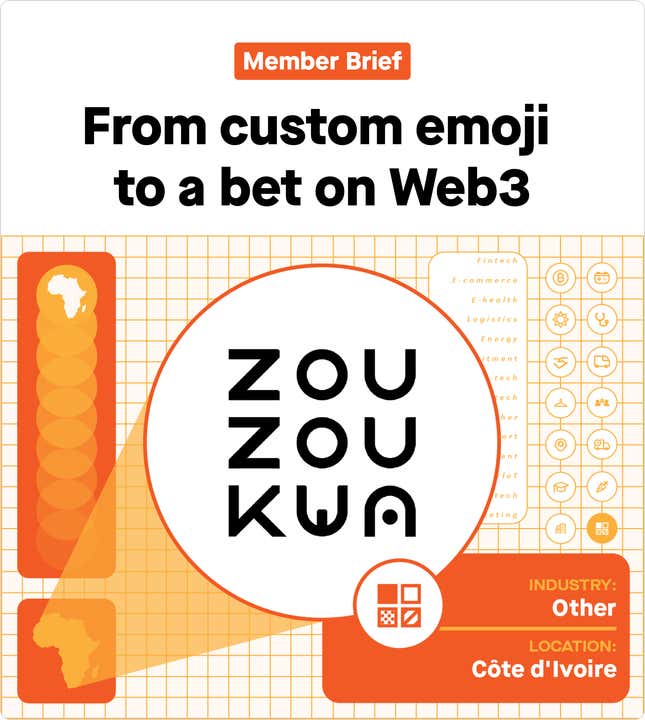
Hi Quartz Africa members!
The co-founder of the world’s largest cryptocurrency exchange recently said that Africa could “lead the future of the blockchain industry.” The continent is already one of the fastest-growing regions for crypto adoption, as many users are drawn in by the promise of quick, convenient, and efficient means of investment, cross-border payments, and remittances.
But while much has been made of cryptocurrency’s potential for revolutionizing the financial sector and generating wealth, less attention has been paid to crypto and blockchain’s potential to improve the social and economic welfare of regular people. That’s finally changing, albeit slowly. In April 2021, the Ethiopian government announced that it would create a national database of digital identification for millions of Ethiopians, one nascent symbol of the blockchain’s potential for financial inclusion.
Another cause for optimism can be found in the crypto art being created and collected by Africans. A handful of African artists have sold collections for tens of thousands dollars using non-fungible tokens (NFTs); others could likewise benefit from creative freedom and autonomy over their work.
Yet for all the hype surrounding crypto, blockchain, and NFTs, Africans still face a number of barriers in accessing these technologies, and contributing to discussions around Web3 (a decentralized online ecosystem that some see as the next phase of the internet). O’Plérou Grebet, founder of the multi-platform project Zouzoukwa, wants to help.
🌍 Tell us what you think! To make sure Quartz Africa provides the content you’re looking for, we need to hear from you—take this four-minute survey to tell us what you think and how we can improve.
Cheat sheet
💡 The opportunity: Crypto use is sweeping across Africa faster than anywhere else in the world, thanks in part to the young population’s view of digital currencies as a safer alternative to hugely inflated currencies and traditional banking. At the same time, concepts like the blockchain, NFTs, and decentralized autonomous organizations (DAOs) can provide new creators and entrepreneurs in Africa access to capital and attention.
🌍 The road map: Conversations around Web3 have been largely concentrated in the US and other western markets. Developing a greater focus on opportunities in Africa could generate much-needed local funding and support.
🤔 One challenge: Startups are contending with crypto bans in many African countries, and even regulations make operations complex. But a lack of regulation pushes users into peer-to-peer trades and underground trading alternatives, which can be lucrative ground for scams.
💰 Some of the stakeholders: Accelerator programs like Seed Club are investing in community token projects and bringing startups together with industry experts to form DAOs. The Africa No Filter Emerging Artists grant program is also providing funding and mentorship to help African artists develop and produce projects that shift stereotypical narratives of the continent.
What’s a DAO?
Imagine a company owned and run by its shareholders, without a CEO. Imagine its rules, its governing structure, even its basic functions are locked in and automated by immutable code—specifically by blockchain technology. That’s the central idea behind DAOs, which have become increasingly popular amid a maturing tech ecosystem. But the idea goes beyond corporate structure: Proponents say that the rise of DAOs will transform how people run communities in general, overhauling not just companies, but the broader internet—and eventually, society at large. Read more with our guide to DAOs.
By the digits
23: Countries in Africa with either implicit or total bans on the use and trade of cryptocurrencies
2,500%: Increase in the number of crypto users in Africa from 2021 to 2022
4,800: Existing DAOs traced by the data service DeepDAO
1.7 million: DAO members in global groups tracked by DeepDAO
28.9%: Africans connected to the internet as of 2019
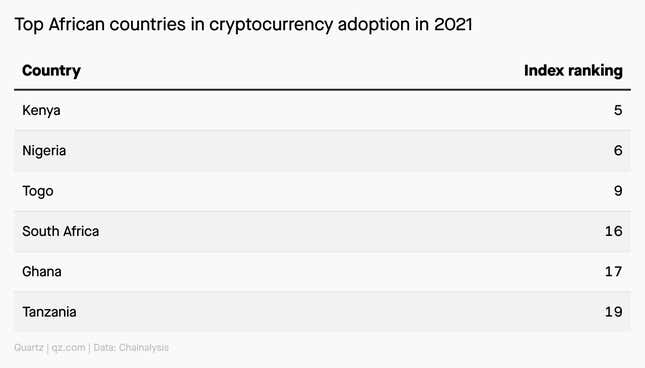
The case study
Name: Zouzoukwa
Founded: 2018
HQ: Abidjan, Côte d’Ivoire
Founder: O’Plérou Grebet
Latest valuation: Undisclosed
Zouzoukwa began as an illustration project on Instagram. Then 20, Ivorian graphic designer and interdisciplinary artist O’Plérou Grebet designed one new African emoji every day for a year to counter stereotypical narratives and present more diverse representations of Africa. “I thought creating emoji would be a fun way for people to discover different cultures and for people to see their culture in another way,” Grebet tells Quartz.
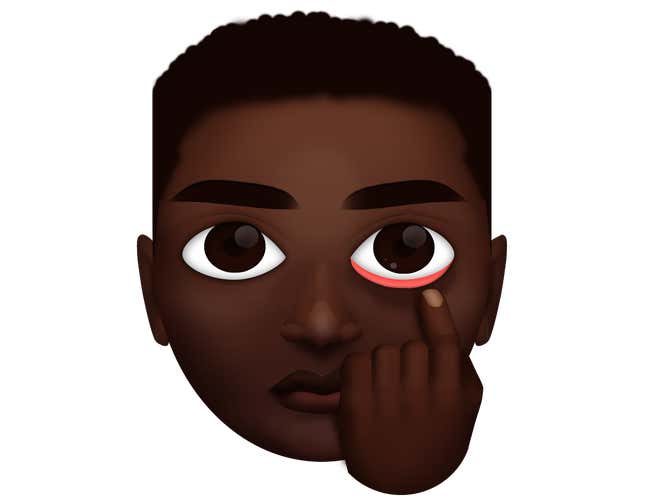
With a Master’s degree in graphic design, Grebet picked up additional skills through YouTube tutorials before in 2018 releasing an app that made his full collection of 371 emoji usable as stickers on WhatsApp and iMessage. Within the first week, the app was downloaded more than 10,000 times and it has since racked up more than 200,000 downloads on iPhones and Androids. Zouzoukwa (which loosely translates to “image” in the local Bété language) was well received, earning Grebet the best app award at the African Talent Awards in 2019 and plenty of international media attention. But the fledgling CEO wasn’t satisfied.
“I was disappointed because the goal of the project was to represent Africa as a whole,” Grebet says. “But most of the emoji are from Cote d’Ivoire and west Africa. So I needed to work together with others to represent Africa more accurately.”
In February 2021, after taking a break from the project to figure out its next direction, Grebet says he was blown away by an article he read about the sale of the Nyan Cat NFT—a one-of-a-kind digital rendition of a famous meme which sold for a staggering $600,000. The more he read and learned about NFTs, the clearer his vision for Zouzoukwa became. In establishing the project as a DAO, he could fulfill his mission to build a community-owned collaborative platform that promotes culture and changes negative perceptions of Africa.
Currently, Grebet operates as a one-man show. Through grants and crowdfunding, he plans to hire a small team of developers to work on the DAO products and sell his emoji as NFTs. He also hopes to hire a community manager to reward early contributors and supporters with digital coins, as well as others to train new users about how to use these technologies.
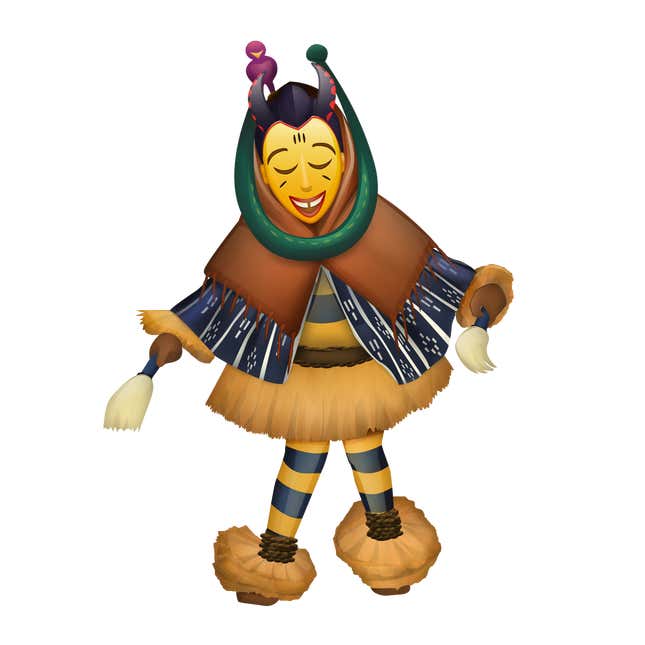
So far, two of Zouzoukwa’s emoji—Hamsa and Pouring Liquid—have been approved by the Unicode Consortium, and will be available on most platforms in August. But Grebet has bigger plans for the rest of his collection: “I want to create a website where they will have their own platform. Unicode is global, and I can’t submit, for example, a little flower from Cote d’Ivoire. So, I want to decentralize Unicode, actually.”
In conversation with
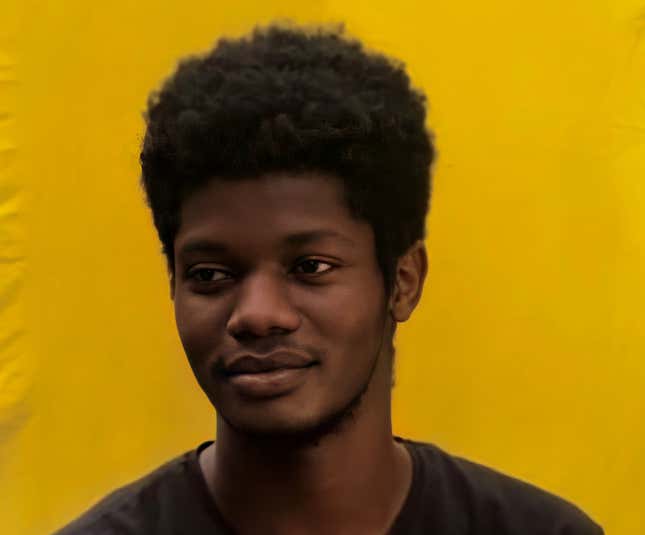
Zouzoukwa founder O’Plérou Grebet has big plans to onboard millions of new African crypto users through his multiplatform digital art project, Zouzoukwa. Here are some choice excerpts from his conversation with Quartz Africa:
♾️ On decentralization:
“There is a lot of money in crypto, but it’s mostly centralized in the US. In theory, someone from Africa should have the same chance as someone from the US, but that’s not how it works. But if we can create emoji, or even other things, we’ll be able to redistribute that wealth and benefit together.”
🤓 On onboarding Africans to Web3 and crypto:
“I want it to be really simple. Before being able to submit emoji to Zouzoukwa, we will teach people what is Web3, what is decentralization, what are tokens, what are DAOs…I want to use small steps because there are many things to learn.”
😌 On mental health:
“It should be talked about more. Everybody knows that there is an impact. We all pretend that it doesn’t exist [in the tech sector] but it does. I prioritize my mental health by putting a limit of five hours of online activity per day and making time to go outside and play sports. I don’t want to burnout.”
Crypto and DAO deals to 👀
Harmony, an open-source block chain, announced in November 2021 that it would provide $2 million in funding over three years to Africa DAO, which focuses on Web3 activities that achieve social impact. Africa DAO will conduct a series of activities, including education and training opportunities, and “tech for good” projects such as remittances, NFTs for creators, land registries, and value-tracing for farmers.
EMURGO Africa, the commercial arm of the Cardano blockchain network, is allocating $100 million for an investment and incubation program to support 100 African startups within three years. EMURGO Africa will first target pre-seed blockchain startups with a market capitalization of $20 million or less in blockchain sectors including NFTs, as well as other emerging technologies geared towards social impact.
Jambo, a Congo-based startup building Africa’s Web3 user base and democratizing access to crypto-based income-generation opportunities, raised $7.5 million in seed funding from Coinbase and Alameda Research in February of this year. Jambo aims to onboard millions of African users to Web3 through its telecom and social media applications and play-to-earn games. Jambo is also launching a full university curriculum on Web3 and has already signed up more than 12,000 students from 14 African countries.
More from Quartz Africa
😀 Africa’s first NFT collection inspired optimism
✊🏿 A Mandela NFT sold for $130,000
📈 A crypto ban did not stall Nigeria’s crypto growth
🇰🇪 Kenyans lead the world in peer to peer crypto trade
📱 Nestcoin plans to mainstream crypto in Africa
🕸️ What are decentralized autonomous organizations?
👀 The decentralized web is not decentralized
🎵 This brief was produced while listening to “Peau de Chagrin / Bleu de Nuit” by Baloji (DRC/Belgium)
Have a highly motivated rest of your week,
—Maxine Betteridge-Moes, Quartz Africa contributor in London
One 😧 thing
When the first DAO launched in 2016 —“The DAO”— it was considered the greatest crowdfunding project of all time. It gathered 12.7 million Eth (equivalent to $168 million at the time) at launch. But when a bug was found, hackers exploited a loophole and $60 million was stolen from the DAO wallet. While many believe the technology has improved since, the nature of open-source technology and self-organizing systems makes the system vulnerable.
